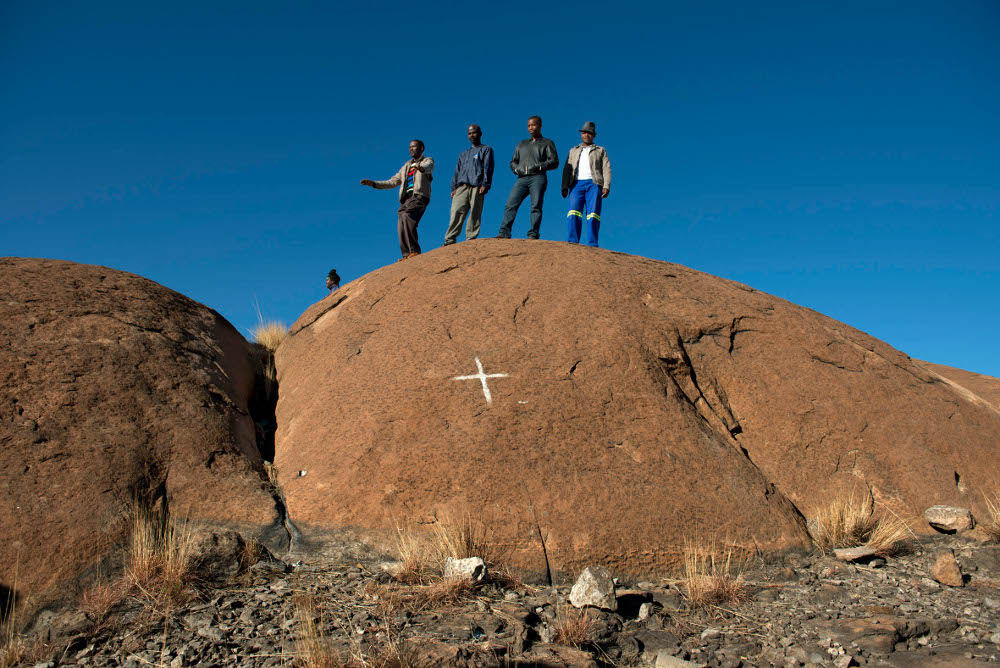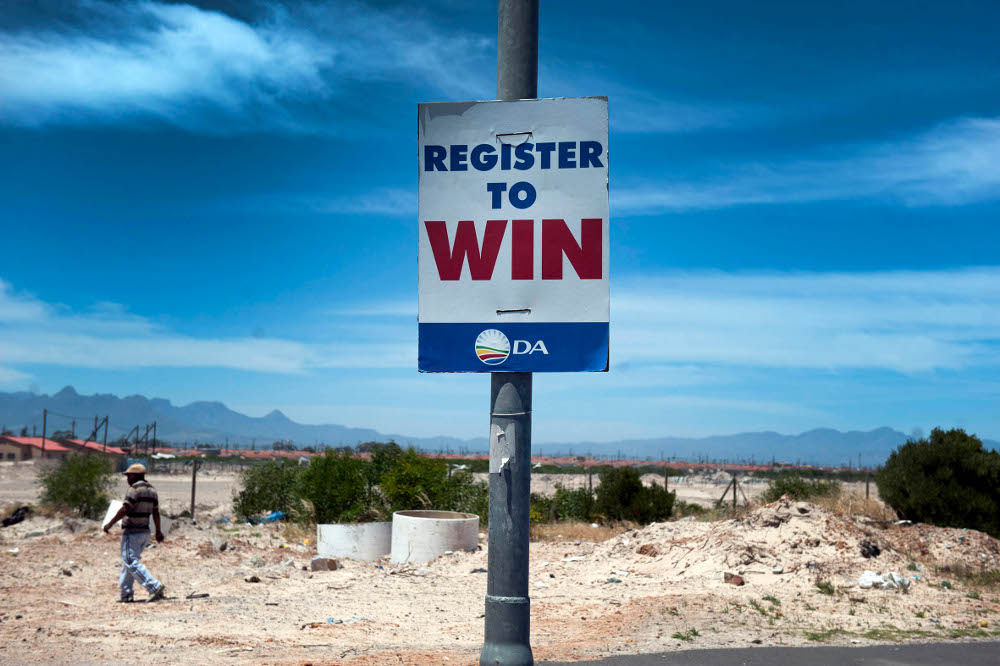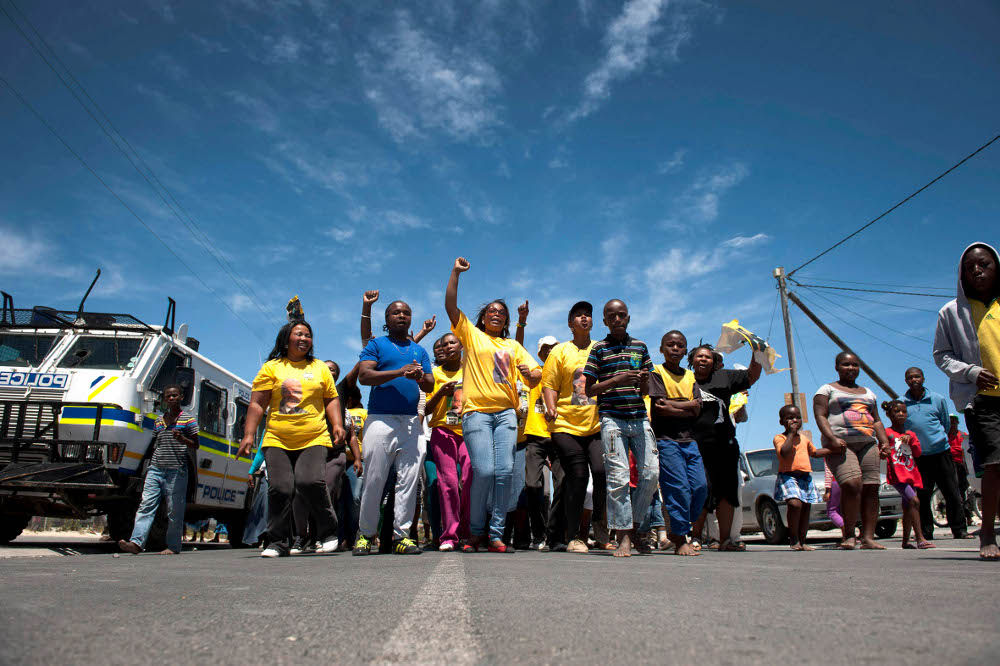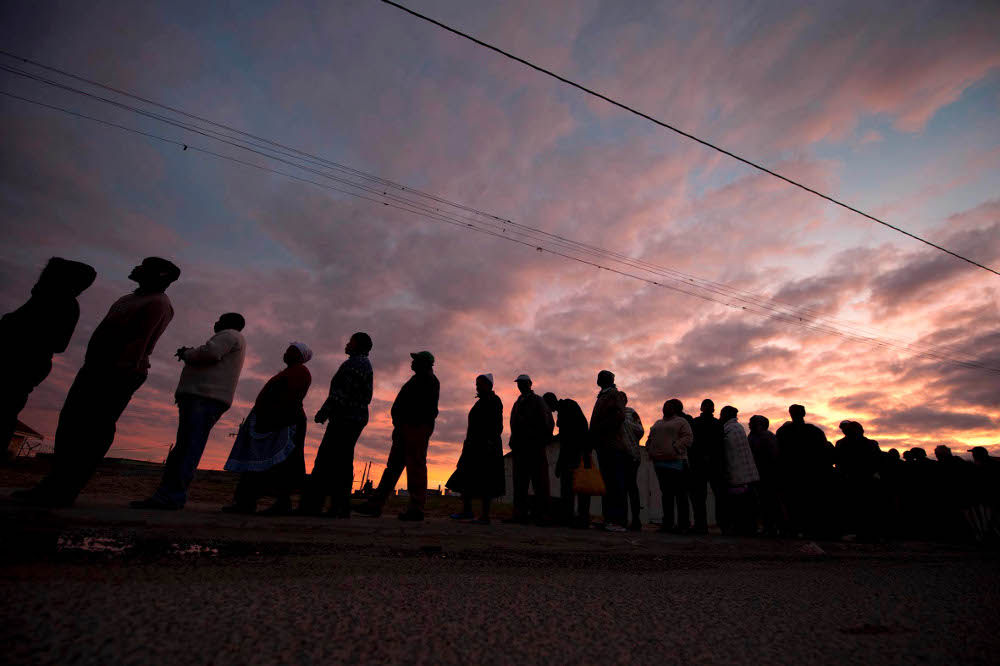E is for EFF.
With the 2014 general elections taking place in two months' time, here is an A-Z guide to the people, parties and issues that will matter come May 7.
A is for ANC
Most good stories have a happy ending, so we hope the ANC gets one after forcing that phrase down our throats ad nauseam.
But there's a new twist in the usually predictable election plot: the ANC has never had to face a serious challenge from the left at the polls before. The official opposition, the Democratic Alliance, comes from the right, which the ANC has easily painted as a bunch of uncaring, imperialist no-gooders.
But the emergence of Julius Malema's Economic Freedom Fighters (EFF), the dramatic rise in service delivery protests and the splintering of the ANC's labour partner, Cosatu, means that the ANC is being damned as a running dog of capitalism.
The party has its work cut out: holding the centre while staving off challenges from those far more radical than the ANC can afford to be.
B is for Born-frees
We agree with President Jacob Zuma on this one: the term "born-frees" is so 2012. These post-1994 millennials are better described as the pop generation: they are attuned to all things instant, catchy and, above all, about themselves – or, as the post-hardcore band Fugazi so memorably put it, "generation fuck you".
The Independent Electoral Commission (IEC) was hoping to get the majority of the country's nearly two million 18- and 19-year-olds registered, but ended up with fewer than 700 000 – and that was after an advert featuring graffiti! Not even Malema could get this lot to care about politics.
It's anyone's guess whether they'll show up at the poll on voting day or spend the public holiday holed up with their phones.
C is for Coalition
Remember that tired phrase, "the realignment of South African politics"? It was bandied about at the time of the attempted marriage between the DA and Agang SA.
Coalitions between political parties could secure that strong opposition the country keeps dreaming about. But, so far, they have been a damp squib – for instance, the "collective for democracy", that is, an unlikely combination of small (and, frankly, dying) parties such as the Freedom Front Plus and the Inkatha Freedom Party.
The most interesting coalitions will emerge after the elections, when the ANC, DA and EFF will take the lead, in that order, and possibly have to find partners to govern some areas. Our bets are on a DA/Agang sequel out of pure necessity. You can start groaning now.
D is for DA
It has been and will continue to be a tough election season for the country's biggest opposition party. Its every move is scrutinised, criticised and then turned into an insulting Twitter hashtag whenever possible.
The fact that the DA runs a province has upped the stakes: it uses the Western Cape as an example of its ability to provide clean and efficient governance. But the ANC and others have used it as an example of how the DA has yet to shift the needle on improvement in the less touristy parts of the province, where the poor and largely coloured and black African live.
Still, the party is bound to grow from the 16.7% it got in the last elections. It won't win Gauteng as it aims to but it can look forward to the EFF cutting the ANC's majority. After the polls, the DA has to focus on succession and what's next for the future.
E is for EFF
Even the most neoliberal are carefully watching the sharply dressed Marxist-Leninist-Fanonist-talking new kids on the block.
Despite commander-in-chief Malema's indiscretions and alleged corruption, the party seems to have a direct line to the poor, the marginalised and the young, who are fed up with the ANC. It will be fun to have some red berets in Parliament. Hopefully the EFF can get there, given its dire financial challenges – corporate South Africa isn't exactly lining up to donate to these would-be nationalising socialists.
F is for Funding
South Africa is one of a handful of countries with no legislation regulating the funding of political parties.
The issue came to the fore again when a mysterious funder was revealed to be behind the ill-conceived Agang-DA merger. The late lamented Institute for a Democratic South Africa warned about anonymous funding for years. It is bad for democracy – for more reasons than just a failed opposition merger.
Still, we can expect parties to continue acting like schoolkids in a contest for public indecency: I'll show you mine if you show me yours. Nobody wants to go first.
G is for God
You may be praying for God to help you to survive the next two months of election overdrive, but politicians are trying a different divine tack: getting the Big G on their side or, failing that, some of his followers.
The ANC is an old hand at this, having promised to rule until the second coming. When Zuma doesn't have a direct line to the wrath of God, he (and many others) can also be found at churches, mosques and temples spreading the ANC gospel.
Not to be outdone, the EFF went to Nigeria to get "prophet" TB Joshua's blessings. It's not known what the DA et al are doing to compete, but they had better be hauling out their crucifixes, yamulkas and prayer mats to keep up with the religious opportunism.

Alternate alphabet: I is for issues that affect voting patterns, such as Marikana. (Paul Botes, M&G)
H is for Hope
So what hope do we have for a sparkly new South Africa, given all these wildly positive election promises from all the parties? Not much, to be honest.
South Africa's political parties are ace at summoning up improbable policies ahead of elections, like some chimera from the deep: six million "job opportunities", decent wages, investors at our feet …
In the cold light of day, however, when implementation must take place, these mirages disappear and we're left with watered-down solutions.
If you want to hope for something, try the idea the ANC will run hard with the National Development Plan – not because it's necessarily the right plan but because investors are begging us to stick to one economic framework for long enough for them to bank on us.
I is for IEC
In 1995, British actor Hugh Grant was arrested for dallying with a transvestite prostitute, destroying the fantasies of women everywhere. What does that have to do with the IEC?
Like Grant, the previously impeccable body's brush with the law – a botched leasing deal – wasn't a massive crime and both parties got off with a slap on the wrist. In the IEC's case, chairperson Pansy Tlakula didn't benefit from the irregularities but many now have trust issues.
The IEC didn't have a smirch on its name but now there's a damning public protector report on the lease, as well as worrying noises about being biased towards independent candidates in the Tlokwe by-elections. Expect paranoid South Africans to look at any election outcome with a jaundiced eye.
J is for Jobs
If you're South African, you should know that at least one in four citizens is struggling to find work. If you don't, you live in an enclave of privilege and don't read the papers.
The reality of South Africa's dire economic inequality and lack of work opportunities weighs heavily on our collective consciousness – and the economy. We can't go on like this; that ticking time bomb of unrest among the largely unemployed youth is only getting louder.
Accordingly, jobs are the big buzzword this election, promised in dizzying numbers by the ruling party and opposition – decent jobs, job "opportunities" or jobs that pay insanely well – if the EFF is to be believed.
We need more than buzzwords and promises on this one. We need something close to a miracle.
K is for Killings
The 2012 Marikana massacre still casts a pall over our recent history; it says bullshit to the ANC's good-news story. The vision of 34 protesting miners being shot has stayed with us, a vicious reminder that the liberators can dish it out just
like the violent oppressors before them.
We hoped it was a wake-up call for our police but instead we've seen a trigger-happy force released on protesters, racking up civilians deaths in heart-breaking numbers over the past few years. Andries Tatane, Mido Macia and the killings at De Doorns and Brits are the tip of the iceberg, with cases of alleged police brutality increasing by 313% in the 10 years since 2001, according to the Institute for Security Studies.
Killings will play a role in this election as the emerging new left cosies up to the people on the ground who feel the police's heat.
L is for Left
A remarkable thing is happening in South African politics: the left is breaking free. Until now, the ruling ANC absorbed these forces into its broad church. The role of the left was largely to appease the masses come election time, then sit back disgruntled for the term that followed.
The ANC continues its largely centre-right economic programme, whatever the left says. But one group has tired of the charade, breaking away with an eye on the 2019 elections. The National Union of Metalworkers of South Africa (Numsa), Cosatu's biggest and most vibrant trade union, is working towards a "united movement of the left" that will unite the grassroots social movements the tripartite alliance has so far ignored or suppressed. Such a party could be a serious threat to the ANC in the long term.
M is for Malema
Move over Madonna, our own "black cat with many lives", as he described himself, is the king of the makeover. The potty-mouthed former ANC Youth League leader wants to be your president and he's promising a government of the people.
He has traded his designer clothes and Breitling watches for red overalls and a beret to create a working-class image. His insulting rhetoric has made way for a powerful speaking talent that puts him ahead of his competitors on the stage. There are those who won't forget his past easily but his legions of fans will have no idea what you mean if you say "hypocrite".

Alternate alphabet: P is for posters. (David Harrison, M&G)
N is for Nkandla
As with the location of the "fire pool" that launched a thousand sarcastic tweets, the Nkandla scandal may be Zuma's longest-lasting legacy. It is now a serious election issue, judging by the time spent on it by the ANC's top dogs at their national executive conference before their manifesto launch.
Will ANC voters swallow it as they swallowed the bitter pill of Zuma's 101 previous indiscretions? Maybe. But not everyone can turn a blind eye any more. Expect corruption to contribute to any decline in the ANC's support this election.
O is for Oscar
Love or hate the murder trial of Oscar Pistorius, be prepared for it to dominate your Facebook news feed even more than the usual fare of babies, cats and inspirational quotes.
What has it to do with the elections? Timing. The mega-trial will take up the month of March, with judgment expected by the end of June. That puts it squarely in the election period and offers a neat respite for those bored by politics.
P is for Protests
The number of service delivery protests has skyrocketed in the past five years. We may not have an Arab-style people's revolution on the go but South Africans are increasingly taking to the streets, sometimes violently, to be heard.
This can only be because the communication lines with the government are not working. Local government and councillors should head off these concerns before they reach the streets but it seems the state and the ruling ANC have lost touch with the people.
Q is for Queers
We're not Uganda – that's one thing to be grateful for. Most of our political parties, barring the fringe African Christian Democratic Party, have progressive views on gay rights, and the Constitution disallows discrimination on the grounds of sexuality. Score 1 for South Africa, 0 for the rest of the continent on this one.

Alternate alphabet: R is for registration. (David Harrison, M&G)
R is for Ramphele
Most South Africans have relegated Agang leader Mamphela Ramphele to the political graveyard after her disastrous attempt to enter politics through a special arrangement with the DA.
She may have racked up accolades in other fields but she doesn't have the political nous to run a party. The consensus is that her ailing party will be decimated at the polls; it will survive only if it gets a hand up from the once-spurned DA (see "coalitions"). It's like a Jane Austen plotline, except less interesting.
S is for Sunshine journalism
As South Africa heads into a key election, it deserves quality news coverage and analysis.
But the SABC has promised 70% good news, the Guptas' New Age newspaper and TV channel ANN7 run on pro-government propaganda and Iqbal Survé's purchase of the Independent group offers the same, with added self-aggrandisement for Survé himself. We ask: Is the glass 30% full, or 70% empty?
T is for Twenty
That's two decades of democracy under our belt – and we have much to show for it, thanks in large part to the ANC. But is it enough? Too many people have failed to reap the rewards of democracy. We need new ideas and energy to shift the needle on the hot-button issues of unemployment, crime and poverty.
U is for Underdogs
The year 2014 will mark the start of the underdogs coming out on top.
Numsa, alienated from its alliance partners, now offers the prospect of an exciting political formation in the future. Malema was crushed by the ANC after he fell out of favour with Zuma but now poses a threat to the party at this year's polls.
And the nobodies behind Ramphele in her party wouldn't let her get away with ignoring them in her flirtation with the DA, successfully applying pressure on her to renege on the deal.
But Zuma is also adroit at portraying himself as the underdog, victimised by satirical artists and the like, so he might be top dog again.
V is for Vavi
Suspended Cosatu secretary general Zwelinzima Vavi is like a giant socialist teddy bear. He is loved for being that rare breed of politician – principled. His fall from grace within Cosatu, because of an extramarital affair and employment issues, led to ugly battles that leave Vavi in limbo. His once-powerful voice has been limited to Twitter – for now.

Alternate alphabet: V is for voters, waiting in line. (David Harrison, M&G)
W is for White versus Black
Race wars are far from over in South Africa's politics but the conversation appears to be slowly shifting.
Once, every election was a white-versus-black issue, thanks in part to the DA-versus-ANC wrestling match. With the emergence of a new left unbeholden to the ANC, the debate has opened up somewhat.
But the race wars aren't over yet, especially if DA leader Helen Zille is allowed to punt more of her paranoia on Twitter.
X is for X
In elections, you put your X next to the party you support. Even Black Consciousness activist Andile Mngxitama, who boycotted the 1994 elections as part of the disgruntled Azapo, will vote this year. That's because he now has a party to vote for, having been reincarnated as an EFF leader. Like Mngxitama, those who used to be cynical about making their mark may now see that wanting change without voting is pretty pointless.
About 2.3-million new voters have been added to the voters' roll this year, and political parties are salivating over these potential new supporters.
Also, for the first time, South Africans living abroad will be able to vote, so they can't blame their fellow South Africans at home for choosing a president on their behalf.
Y is for Yawn
Don't dismiss that malaise of so many democracies – voter apathy. In South Africa, it may indicate disillusionment with the ANC more than it shows apathy. But, with more parties than ever trying to get your vote, the stakes are high. Hopefully even the most bored of citizens will take up their ID books and join the queue on May 7.
Z is for Zuma
The man from Nkandla has masterminded his way to the top of the political heap, ensuring that the survival of the most powerful people in his party depends on his own. So, these days, the ANC seems less focused on actively renewing its 102-year-old movement than shoring up its controversy-plagued president.
Already the party has made a misstep as it goes into this election, in which the youth matters more than ever, with a youth league it has crushed. Making Zuma look acceptable takes up so much of the party's energy that he is in effect their biggest liability. Critics say he will be ousted quickly should the party perform badly. But this wily politician has more lives than even Malema, so nothing is certain. And isn't that true of just about everything in politics?
Buckle up: it's going to be a rough but exciting two months. – Additional reporting by Mmanaledi Mataboge